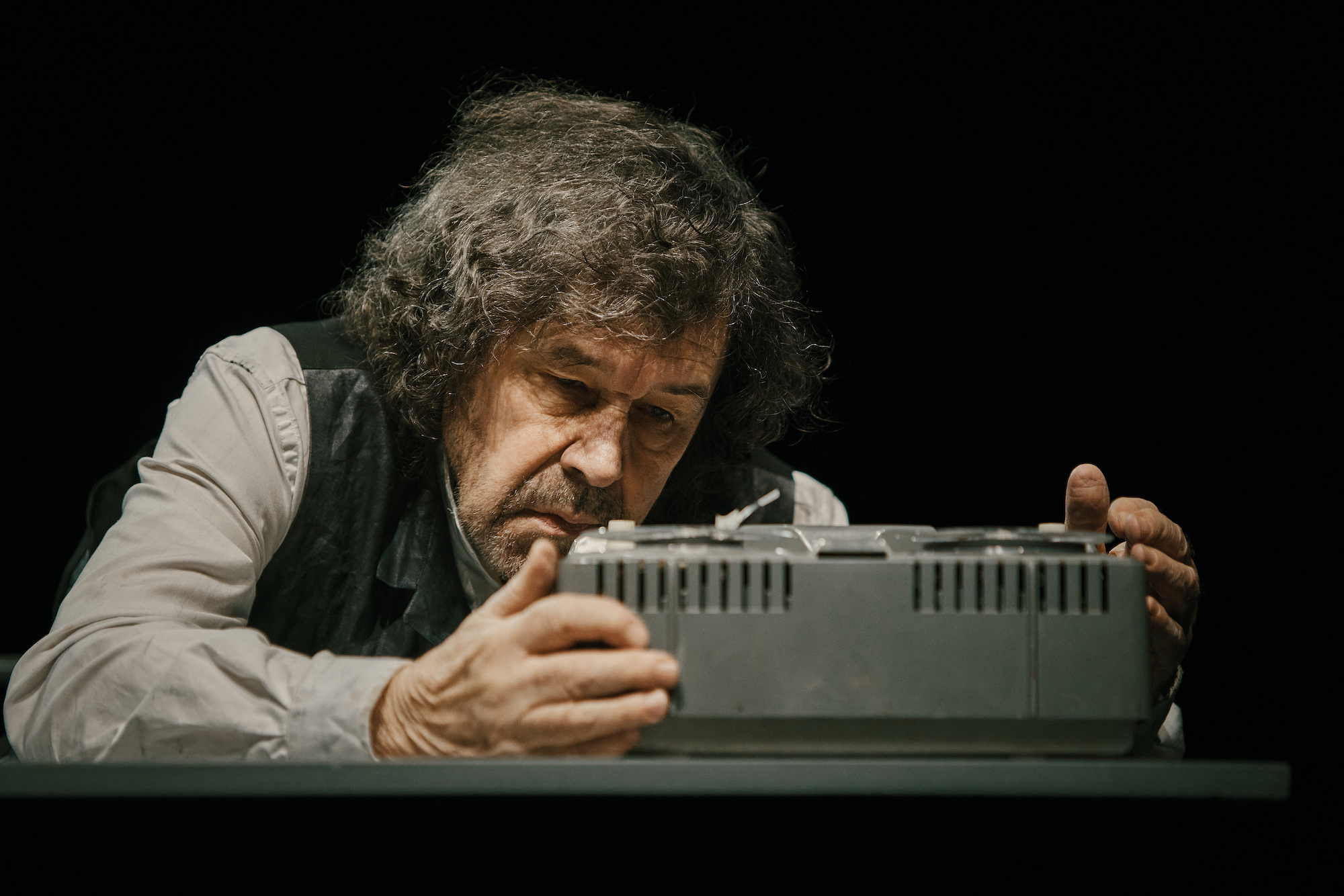In the Stygian darkness of a bare room, a table on a low platform with a light hanging overhead starts to emerge. Then a door briefly opens at the back of the space and the figure that has entered and sat down at the table also begins to emerge. When the stage lighting goes on, this tableau out of a Bacon painting sharpens and we can properly scrutinise the man.
He is played by Stephen Rea, who has arrived from Dublin in a Landmark production of Samuel Beckett’s Krapp’s Last Tape, written in 1958 and directed by Vicky Featherstone. Rea is now almost a decade older than the protagonist, a 69-year-old who looks back on his younger self via one of the tapes he made on his birthday each year, reviewing the previous 12 months. Rea, though, has little of the old codger in him.
In white leather ankle boots, he scurries about the stage, visiting the illuminated room through the door behind him, where we can hear him splashing about at a sink and, apparently, having a pee break. Rea’s hair is a shaggy helmet around his thin, pointed face, a look that lends him a clown-like air; and his careful, precise movements are those of a mime or silent-movie actor – Chaplin preparing to eat his shoe, Buster Keaton fixing the camera with his deadpan gaze. Adding to the gags is the design of the table drawer, which he unlocks and pulls out… and pulls out and pulls out, until it is almost as long as the table.
The treasure inside this surreal locked drawer turns out to be a banana, which he fastidiously peels and munches on, throwing the skin on the floor. The pratfall has been set up: going back to the drawer, he almost skids on the skin, naturally. When he returns for a second banana, discarding the skin the same way, he then earns laughs by stopping and staring warily at it, before picking it up and flinging it away.
When Krapp starts talking, the comedy continues. There's the moment when he becomes fascinated with the word “spool”, which Rea toys with and, through pursed lips, pronounces “spooooowul”, in a silly high voice. Then, in an old ledger with diary entries, he comes across an archaic word, “viduity”, that occasions more stage business: fetching a fat tome that turns out to be a dictionary and leafing through it to the V-section and the definition he needs.
One of the most recent Krapps, Harold Pinter, was denied much of this physical comedy as he was wheelchair-bound and his interaction with the set was limited by that; Rea’s performance underlines now much a lightness of touch adds to the whole. The clowning emerges as a vital counterbalance to the mournful anger that builds as Krapp produces a tape deck from the drawer and starts listening to a tape made 30 years earlier on his 39th birthday, when, he decides, he was on "the crest of a wave”. (Rea presciently recorded the extracts on it 12 years ago, so there would be a version with a younger voice if he ever got to play Krapp.)  Krapp’s playing of the tape betrays his ambivalence about what he is hearing, stopping and starting the machine in aggressive bursts. One uninterrupted stretch is a tender description of the lover he broke up with on a punt ride, followed by a vow to drink less and have a less engrossing sex life. As he moves on through the tape, though, he noticeably hits the fast-forward button to cut the punchlines to the most challenging issues it raises.
Krapp’s playing of the tape betrays his ambivalence about what he is hearing, stopping and starting the machine in aggressive bursts. One uninterrupted stretch is a tender description of the lover he broke up with on a punt ride, followed by a vow to drink less and have a less engrossing sex life. As he moves on through the tape, though, he noticeably hits the fast-forward button to cut the punchlines to the most challenging issues it raises.
Rea mercurially moves through the range of Krapp’s emotions, an older man taunted by his younger self who has only visits from Fanny, a boney old ghost of a woman, to call sexual activity. He is palpably bitter and isolated, still squaring up to what he has, and hasn’t, made of his life, and prone to bursts of pettish violence, dramatically scattering all the boxes of tapes he has stacked up.
Yet the caustic wit in him, which Rea spits out, still burns bright, skewering his losses and trying to deflect them. His face moves from rapt interest, his body almost embracing the tape deck, to a snarl or a sour laugh. He begins to record a new tape but throws it away and returns to the 30-year-old one and the woman in the punt, a scene he listens to all over again, his jaw slack and his eyes fixed on the middle distance, then snapping his mouth shut and turning off the machine.
As he declares the best years of his life gone – “and I wouldn’t want them back” – the old Beckett saw of “I can’t go on, I’ll go on” echoes behind his words. It’s both an acknowledgement of defeat and a bold stand against it. A cosmic rumble starts up, and the stage slowly dims to blackness again. Just 55 minutes have passed, but in this short span Rea has gone to the extremities of the world Beckett conjures up. It’s a performance of unshowy brilliance (at his curtain call he sweetly urged us to give a big hand to the tape-deck too) that delivers the work with all its ambiguities intact.















Add comment